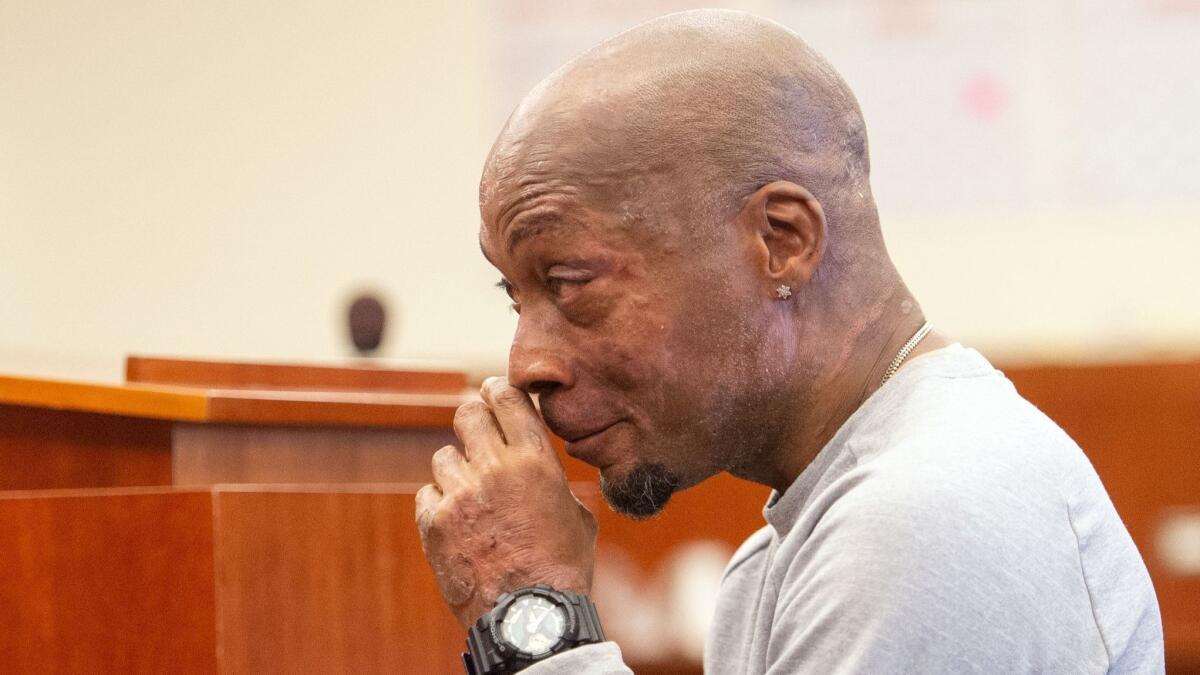California jury awards $289 million to man who claimed Monsanto’s Roundup pesticide gave him cancer

- Share via
A San Francisco jury on Friday found Monsanto liable for a school groundskeeper’s lymphoma that he said developed after years of applying the company’s trademarked Roundup weed killer.
The $289-million verdict in San Francisco County Superior Court is certain to add momentum to a multi-front battle to ban Roundup’s main active ingredient, glyphosate. The compound is applied to millions of acres of crops, many of which have been genetically modified to withstand the herbicide.
The jury deliberated three days before awarding $39 million in compensatory damages and $250 million in punitive damages to groundskeeper DeWayne Lee Johnson, 46. He claimed that years of applying Monsanto’s Roundup and Ranger Pro to school properties in a Bay Area suburb of Benicia caused his incurable non-Hodgkin’s lymphoma.
Activists, who have long battled to ban glyphosate, lauded the decision in the closely watched trial.
“Monsanto made Roundup the OxyContin of pesticides, and now the addiction and damage they caused have come home to roost,” said Ken Cook, president of Environmental Working Group. “This won’t cure DeWayne Lee Johnson’s cancer, but it will send a strong message to a renegade company.”
The verdict “signals a turning tide,” said Linda Wells, Midwest organizing director for Pesticide Action Network. “It’s time to get carcinogenic pesticides off the market, and fight for the protective regulations we all deserve,” Wells said.
Monsanto, which continues to be run independently after merging earlier this year with German agro-industrial giant Bayer AG, said in a statement that it will appeal the verdict.
“We are sympathetic to Mr. Johnson and his family,” said Scott Partridge, Monsanto’s vice president of global strategy. “Today’s decision does not change the fact that more than 800 scientific studies and reviews — and conclusions by the U.S. Environmental Protection Agency, the U.S. National Institutes of Health and regulatory authorities around the world — support the fact that glyphosate does not cause cancer, and did not cause Mr. Johnson’s cancer.”
Nationwide, growers have used an estimated 1.8 million tons of the chemical since it was introduced in the mid-1970s, according to government and industry estimates.
The bulk of glyphosate was sprayed on tens of millions of acres of corn and soy in the Midwest. But California growers also applied it to more than 200 crops across 4 million acres, including 1.5 million acres of almonds, making it their most widely used herbicide, according to the California Department of Pesticide Regulation.
Having inherited a company long vilified by environmental activists as “Monsatan,” Bayer faces high potential liabilities from hundreds of similar lawsuits, along with a battle over adding a cancer warning label on products sold in California.
A U.S. District Court judge earlier this year temporarily halted moves by California to require a cancer warning label under Proposition 65, the Safe Drinking Water and Toxic Enforcement Act, passed by voters in 1986.
California’s decision to include glyphosate on its list of chemicals linked to cancer followed a 2015 ruling by the Europe-based International Agency for Research on Cancer that the chemical is a “probable” carcinogen.
The U.S. EPA as well as its counterpart agencies in the European Union have disagreed with the conclusion reached by that panel, which is part of the World Health Organization. Last December, the U.S. EPA ruled that glyphosate was “not likely” to cause cancer.
California’s Office of Environmental Health Hazard Assessment, the agency that listed the chemical as a probable carcinogen, is finalizing its regulation establishing a “safe” threshold under which glyphosate products would be exempt from the Proposition 65 warning provisions.
Follow me: @LATgeoffmohan
More to Read
Inside the business of entertainment
The Wide Shot brings you news, analysis and insights on everything from streaming wars to production — and what it all means for the future.
You may occasionally receive promotional content from the Los Angeles Times.











